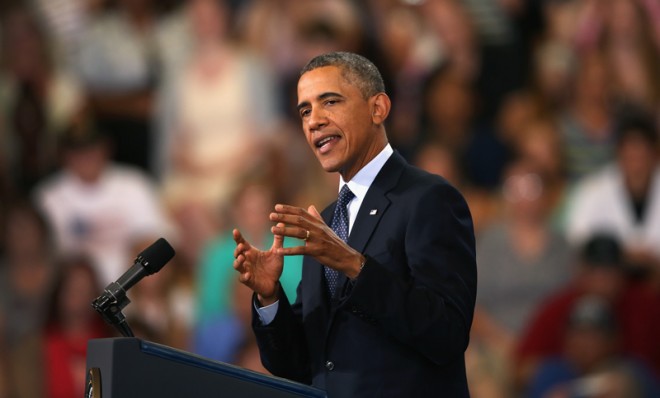Obama's big plan for the economy: Attack the GOP
It just might work

On Wednesday, Barak Obama stopped by Knox College in Galesburg, Ill., to deliver what was billed as the first of several summer speeches about the U.S. economy. It's the same topic he chose eight years ago during a commencement address at the same college, when he was a young senator intent on bridging the gap between Red and Blue America.
But in the years since, a lot has changed. The president has presided over a brutal recession, the beginning of a fragile recovery, and, perhaps most importantly, historically bad partisan gridlock.
As a result, the hallmark of Obama's speech, nominally about the economy, was a decidedly political topic: The stubbornly uncooperative GOP.
The Week
Escape your echo chamber. Get the facts behind the news, plus analysis from multiple perspectives.

Sign up for The Week's Free Newsletters
From our morning news briefing to a weekly Good News Newsletter, get the best of The Week delivered directly to your inbox.
From our morning news briefing to a weekly Good News Newsletter, get the best of The Week delivered directly to your inbox.
"Stop taking meaningless repeal votes and share your concrete ideas with the country," Obama thundered. "Repealing ObamaCare and cutting spending is not an economic plan."
"Unfortunately, over the past couple of years in particular, Washington hasn’t just ignored the problem; too often, it’s made things worse," he added. "And I am here to say this needs to stop. This needs to stop."
He's not just whining. "Obama's anti-Congress tactic holds political potential," said Rebekah Metzler at U.S. News & World Report.
Both Republicans and Democrats are gearing up for a fight regarding government spending as the September deadline for raising the debt ceiling approaches. Some conservatives have even said they will only vote to increase the ceiling if funding for the health care law is cut off, an idea Obama says he's not entertaining. [U.S. News & World Report]
A free daily email with the biggest news stories of the day – and the best features from TheWeek.com
Obama also adopted a more populist take on economic growth, which could have political implications as well. "Nearly all the income gains of the past 10 years have continued to flow to the top 1 percent," he said.
"This growing inequality, it’s not just morally wrong, it’s bad economics," he continued. "Because when middle-class families have less to spend, guess what? Businesses have fewer consumers. When wealth concentrates at the very top, it can inflate unstable bubbles that threaten the economy. When the rungs on the ladder of opportunity grow farther and farther apart, it undermines the very essence of America, that idea that if you work hard, you can make it here."
The Washington Examiner's Byron York had this to say:
And what about the underlying economic argument? Peter Coy at Bloomberg Businessweek says Obama might have stressed the middle class too much.
Going all in on the "middle out" meme is a risky strategy for Democrats. It leans on the Keynesian theory that the economy can suffer from shortfalls of consumption spending by the public, notes Luigi Zingales, a finance professor at the University of Chicago Booth School of Business. But even Keynes said that consumption isn’t always the problem; economies also need entrepreneurs with animal spirits. [Bloomberg Businessweek]
Though Obama didn't lay out any new plans for creating jobs, he reiterated some established plans to spur job growth, including developing new kinds of energy, reinvigorating the manufacturing sector, and spending more on infrastructure. Ezra Klein of Wonkblog says the point of this speech wasn't to talk shop, but to shift focus to long-term job growth:
This speech marked the Obama administration’s pivot from emergency measures to create jobs right now to a more long-term agenda for creating jobs. The speeches Obama previewed Wednesday are on manufacturing, health care, education, home ownership, retirement security, and social mobility. All are worthy topics. None of them offer much hope to someone who’s jobless right now.
In economist terms, Obama is moving from trying to fix "cyclical" problems — namely, the joblessness caused by an awful recession — to "structural" problems. [The Washington Post]
Or as Greg Sargent at the Post put it: "Obama’s speech on the economy today was best understood as an opening shot in what he promised will be a sustained campaign to break the austerity curse that has gripped Washington ever since the 2010 elections."
Carmel Lobello is the business editor at TheWeek.com. Previously, she was an editor at DeathandTaxesMag.com.
-
 Claude Code: the viral AI coding app making a splash in tech
Claude Code: the viral AI coding app making a splash in techThe Explainer Engineers and non-coders alike are helping the app go viral
-
 ‘Human trafficking isn’t something that happens “somewhere else”’
‘Human trafficking isn’t something that happens “somewhere else”’Instant Opinion Opinion, comment and editorials of the day
-
 What would a credit card rate cap mean for you?
What would a credit card rate cap mean for you?the explainer President Donald Trump has floated the possibility of a one-year rate cap